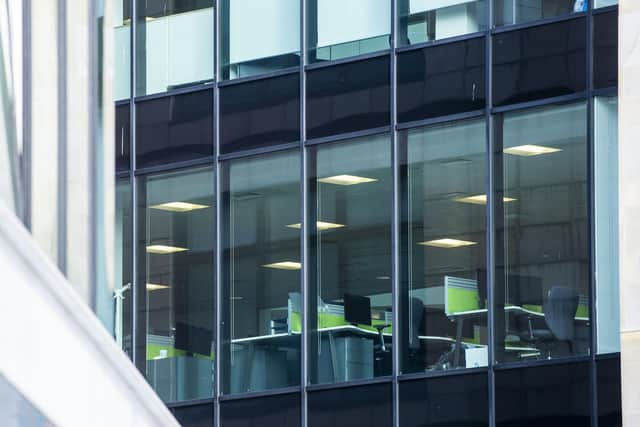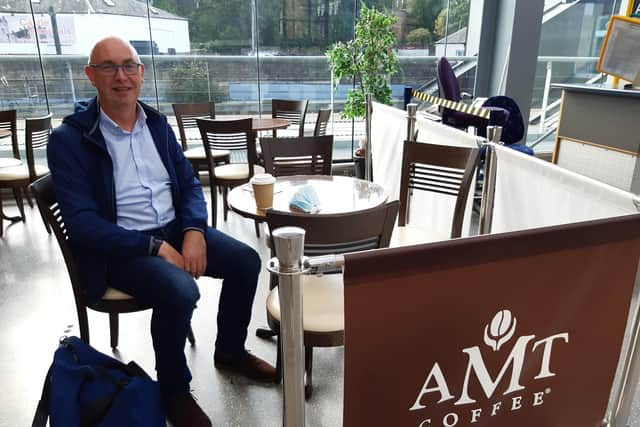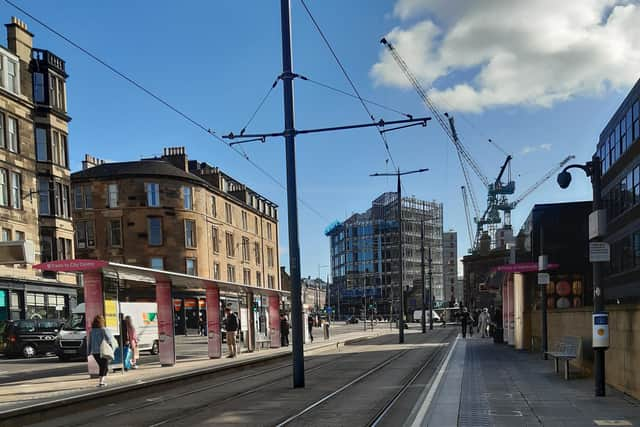Insight: How home working is impacting on Scots and our towns and cities
On a midweek morning, the area around Edinburgh’s Haymarket Station is eerily quiet.
Once a bustling hub, packed with commuters, tourists and workers from surrounding office blocks dropping by the shops and cafes during the day, 18 months into the pandemic, the station concourse is still practically empty, with just a few lone travellers checking the departure boards.
Advertisement
Hide AdAdvertisement
Hide AdAcross the road from the station, numerous shops have shut down, their windows whitewashed and post building up beneath letterboxes.


Tom Paterson, co-owner of Maybury’s gift shop, has watched three businesses located on either side of his store close down in recent months.
"They’ve all gone,” he says, pointing to another gift shop next door, a former florist two doors along and a cafe on the other side. "Even Scotmid has closed up here, which is a huge problem. Where there’s a Scotmid, you get footfall and that’s what we need.
"It’s a struggle to stay open, but when you’ve built up your business over ten years, you do what you can.”
Mr Paterson used to generate a large proportion of his business from overseas tourists – a market which has all but disappeared since coronavirus hit – with the rest coming from passing office workers. He has tried to diversify his sales to appeal more to local trade, stocking up on gifts and birthday cards.


"I’m hoping in the run-up to Christmas, things will pick up and more people will shop local,” he says. “But in this area of Edinburgh, there aren’t a lot of local people, people don’t live here, it’s all offices and tourists – or it was. Most of the offices here are still practically empty.”
Across the road, one huge 1970s office block has been vacated and is earmarked for demolition. Other nearby buildings, which would have once hosted hundreds of staff, have barely a trickle of workers going in in the mornings.
The Scottish Government’s policy – at odds with that of the Westminster government – is to continue to work from home where possible to avoid the spread of the virus. However, in recent months, some businesses have started to request that staff return to the office.
Advertisement
Hide AdAdvertisement
Hide AdPip de Klerk, who works at the Luckie Beans coffee stand at Haymarket Station, says she has noticed an increase in footfall in recent weeks.


"It’s definitely got busier,” she says. “Some days it is still very quiet, but others, it almost seems normal. When we re-opened after lockdown in May, it was just dead. We have a lot of regular customers, who are both commuters and workers at nearby office blocks and some of them are back, though most tell me they are going into the office a couple of days a week and working from home the rest of the time – that seems to be the general trend.”
Gavin Ingram, a financial services worker from Fife, is the only customer at a different station cafe – enjoying a latte on his way back from a business trip to Birmingham. Having taken up a role at a new company earlier this month, he is now travelling to his office in Edinburgh one or two days a week while he learns the ropes – and working from home the rest of the time.
"I’ve been in to learn the systems and meet a few people as I’m new, but I think that will continue,” he says. “Though I would say only about one in 30 people are in the office at the moment, it is pretty much deserted.”


A report published earlier this year by recruitment firm Robert Half found that nearly 70 per cent of workers surveyed would like to continue working from home for one to three days a week for the foreseeable future.
"I don’t know how much that will ever change,” says Mr Ingram. “Some people miss the camaraderie of an office, but others are happy working from home: they’ve got a routine with their dogs, or picking their children up or whatever. I like going back in, it gives you a break between work and home – it is sometimes hard to switch off otherwise.”
He says that confusion, especially between colleagues from offices in different parts of the UK, is rife.
He says: “There are a lot of mixed messages between England and Scotland: Boris [Johnson] is saying one thing and Nicola [Sturgeon] is saying another."
Advertisement
Hide AdAdvertisement
Hide AdOne Edinburgh worker at global services company Atos, based at the Gyle, says the entire staff has been told they all have to work from the office soon – after having been home-based for much of the pandemic. Currently, an estimated 60 per cent of workers are office-based, since the first main tranche of staff was brought back earlier this month, but by the end of October, bosses are believed to have told them almost all workers will be expected to return to the office full-time.
The worker, who asked not to be named, says: "Our European offices all have a ‘stay at home, stay safe’ ethos, but the UK business has told us we have to go into the office. It is a very confusing time for people.


"I was working from home successfully for 18 months and now, I am doing the same job at my desk in the office, absolutely unnecessarily. The company is following government guidelines of return to work – even though they are not following the work from home rule – so we still hold our team meetings remotely on Teams – while sitting next to each other in the office. It makes no sense.”
He says that even workers who have family members who are vulnerable to Covid are being refused the option to work from home.
"They are just told that the government no longer defines people as vulnerable or shielding, so that doesn’t exist any more and they have to go to the office like everyone else,” he says. “People are already getting Covid, as well as other flu and cold viruses. The windows don’t open, the building is just a sealed box with no ventilation apart from air conditioning.”
Recent figures published by the Scottish Retail Consortium showed that Scottish footfall decreased by 21.2 per cent in August compared with two years earlier, a 5.9 percentage point increase from July, but below the UK average decline of 18 per cent. Of major Scottish cities, Glasgow was particularly hard hit, with a 20.3 per cent drop.
Ewan MacDonald-Russell, head of policy at the Scottish Retail Consortium, says: “Footfall in Scottish retail destinations remains more than a fifth below pre-pandemic levels. That has a huge impact on high street businesses who traditionally rely on trade from office workers and tourists to justify the higher costs of operating in town and city centres. Without those customers it’s very hard for those businesses to manage.”
Mr MacDonald-Russell says the organisation believes that a stimulus scheme is needed to get people back onto the high street.
Advertisement
Hide AdAdvertisement
Hide AdHe says: "That’s why there is an urgent need for some form of stimulus to encourage shoppers back to town and city centres to support those hard hit businesses – the £100 shopping voucher scheme we will see in Northern Ireland next month is a great example of what could be possible.”
However, Leigh Sparks, professor of retail studies at Stirling University, believes that while city centre businesses are struggling, some others in smaller towns are thriving – as people use their local shops during the working day.
He says: "Obviously, if you look at the big cities – and particularly the big two in Scotland of Glasgow and Edinburgh – then we’ve got obvious issues about the volume of central based workers and commuters and the comparative lack of footfall.
“Yet in some smaller towns, retailers and hospitality businesses are seeing an uptick in business from the fact that people are based more locally. I think looking ahead, in smaller towns such as those in the Borders, we could see more co-working spaces and people using them.
He adds: "Retailers, particularly larger ones, need to recognise that big changes are underway. The world has changed and we’re in the process of understanding and adjusting to that change. While this creates a problem for some businesses, it creates fabulous opportunities for others.”
Retail analyst Graham Soult of Canny Insights agrees.
"I was in Blairgowrie last week and I would say that it is more vibrant than it was the last time I was there, before the pandemic,” he says. “There were people sitting outside, having coffee at lunchtime and it had a really nice buzz about it. It was the same in places like Pitlochry and Dunkeld – there are almost no vacant shops. It really is a twin story here of what you see in the big cities and the smaller places where people are spending their time.”
Scottish Government guidance encourages businesses to facilitate flexible working practices for their staff.
A spokesman says: “We continue to advise home working where possible, recognising that some staff will start to return to offices in line with staff wellbeing discussions and business need. Encouraging working from home is an important mitigation in controlling the virus and ensuring that we can continue to minimise other economic and social restrictions.
Advertisement
Hide AdAdvertisement
Hide Ad"In the longer term we encourage employers to consider moving towards a hybrid model of working, allowing both home and office-based working, which can offer benefits beyond the need to control the virus.”
A spokesperson for Atos says: “We operate to Scottish government guidance and will look into this.”
*********************
In the first few months of the pandemic, workers, managers and unions raised concerns about staff mental health while isolated at home.
In May 2020, research from the Mental Health Foundation and LinkedIn showed almost nine in ten office workers in the UK said working from home was having a negative impact on their health, and a third said they were sleeping badly as a result.
When not in the office they felt they needed to “prove” they were working hard and deserved their jobs.
Nine months later, a poll released by the Royal Society for Public Health (RSPH) in February 2021 found the majority of people did not want to return to the office full-time, with three quarters saying they now wanted a flexible approach.
But people still reported an impact on mental health, with more than half saying they found it harder to switch off from work, and a third reporting an impact on sleep.
Since then, the culture around working from home because of Covid-19 has changed, according to Chris O’Sullivan of the Mental Health Foundation.
Advertisement
Hide AdAdvertisement
Hide AdThere was an initial sense of collective support during a short-term crisis in March and April 2020, he says.
And then when it became clear the situation would not be short-term, people focussed on just getting through.
Now, after 18 months, some workers are at the end of their tether after the “marathon” of the pandemic.
Others are uncertain as they do not know when the rules around working from home will change, while still more are “optimistic and excited” about a return to the office.
Laura Hamilton, 32, a leadership workshop host at By Compass, has been working from home from her flat in Edinburgh throughout the pandemic.
In the beginning she found it “pretty miserable” and that her world had “shrunk”, and work loomed larger in it.
“Managing people remotely is a skill that I think most managers don't always have - I certainly found it a struggle at the beginning.”
But there have also been benefits.
“The main takeaways from working from home have been that I’ve got to design my working day myself, which has made me more productive rather than ‘busy’, and that work isn't my main focus in life which has made me enjoy it more,” she says.
Advertisement
Hide AdAdvertisement
Hide AdMs Hamilton would now rather continue working from home until Covid cases begin to reduce, as she would “rather be safe than normal”.
She is not keen to return to the commute, and many others are glad to have left this behind.
“I never want to have the hassle and expense of commuting into the office ever again,” says Andrea Sutherland, who used to spend two to three hours a day on buses to and from work.
“I always felt stressed from the bus journey, but now I just have to wander down my stairs to my ‘office’... no queues to stand in, in all weathers wondering if I will actually get a seat on the bus if it turns up, no watch or bus app checking or wondering if I’m going to be late,” she says.
“I’m told I will have to go in for meetings and training but we haven’t had to do this for 18 months so I see no need for it now.
“I’m perfectly happy where I am, and statistics show I’m more productive.”
Mr O’Sullivan underlined the divide in attitudes towards working from home between those who are comfortable doing so, with an office, or a garden, and those who are less so.
“If you're in an office and people are performing pretty well [from home], you might make a logical decision to downsize the office or even get rid of the office,” he says.
Advertisement
Hide AdAdvertisement
Hide Ad“But if your workforce is people who have shown outstanding resilience to run a marathon during the pandemic, and they're now really tired and need to be back in an office together to be productive, then there's a real risk that if you make that decision from your study, in your nice house with your nice garden, that could create a long-term wellbeing impact [on staff].
“The obligations that workplaces have in relation to health and safety at work, including psychological safety and the duty to avoid stress and psychological injury, that is equal on employers whether people are working at home or not.”
The RSPH research also found a difference in attitude depending on housing arrangements, with people living with multiple housemates more likely to say working from home was worse for their health and wellbeing than those who live on their own.
Those living with a partner fared even better.
Michael Crosby lives with his partner and has “really enjoyed” working from home in his marketing role for an insurance company.
The 35-year-old from Glasgow believes a flexible approach will be the norm in future, and while recruiting has noticed young candidates asking about this.
He is now working around four to six days per month in the office.
“I've really enjoyed working from home. I get peace and quiet to work which you don't really get in an office,” he says.
“Now that we're starting to move to a hybrid model with some days spent in the office, we're actually seeing people saying things like, 'oh sorry I missed your email, I was in the office yesterday' or 'I've got so much to catch up on at home because I was in the office and it was hectic'.
Advertisement
Hide AdAdvertisement
Hide Ad“My boss even went back home early one day 'to get some work finished'.”
Mr Crosby adds that his positive experience may be linked to having an office and a spare room at home.
“I do get why some people have struggled with it,” he says.
“But working from home suits some people well, myself included.
“If you have the right set up at home and the right mindset for it, it's really beneficial.
“I'm sleeping better, eating better, saving more money and getting more done. I hope a flexible approach with a few office days per month does become the new normal.”
For Ms Hamilton, not having the space for a home office has been one of the biggest problems with remote working.
“A lot of people (including me) don't have space for home offices at the moment - that's a big problem,” she says.
“Two people working from a one-bedroom flat is hardly ideal - I've found it really hard to concentrate on tasks sometimes.”
Advertisement
Hide AdAdvertisement
Hide AdThe easing of lockdown has slightly improved this, she says, as on occasion she is now able to work from a cafe.
“I think it's clear that a lot has changed and the idea we can ‘go back to normal’ is not practical,” she says.
“We need to find a solution that works for everyone, and is not about managers wanting to control their team. Remote working is more accessible for a lot of people, and gives more flexibility to those who need it as well.”
There is a “real opportunity” for businesses to think about how they can support their employees in any return to the office, says Mr O’Sullivan.
“While some may want to get back to the office as soon as possible, businesses need to think about how to retain some of the benefits of working from home for people with disabilities, childcare commitments, or who might otherwise have preferred it,” he says.
“What we've seen is that the populations who are already experiencing poor mental health or more likely to experience mental health problems are the ones who are recovering less quickly from the pandemic,” he says.
“They are often people for whom work can be really, really important.
“And as we're all celebrating getting back to the office there is still a cohort of people who don't have access to effective vaccines [as they are immunosuppressed], or still have or care for people with really severe health conditions.
Advertisement
Hide AdAdvertisement
Hide Ad“There's a risk that some of those people might be left behind, when actually working from home has been amazing for some disabled people, for whom finding different ways to do things has been part of their whole lives.”
A message from the Editor:
Thank you for reading this article. We're more reliant on your support than ever as the shift in consumer habits brought about by Coronavirus impacts our advertisers.
If you haven't already, please consider supporting our trusted, fact-checked journalism by taking out a digital subscription.
Comments
Want to join the conversation? Please or to comment on this article.
